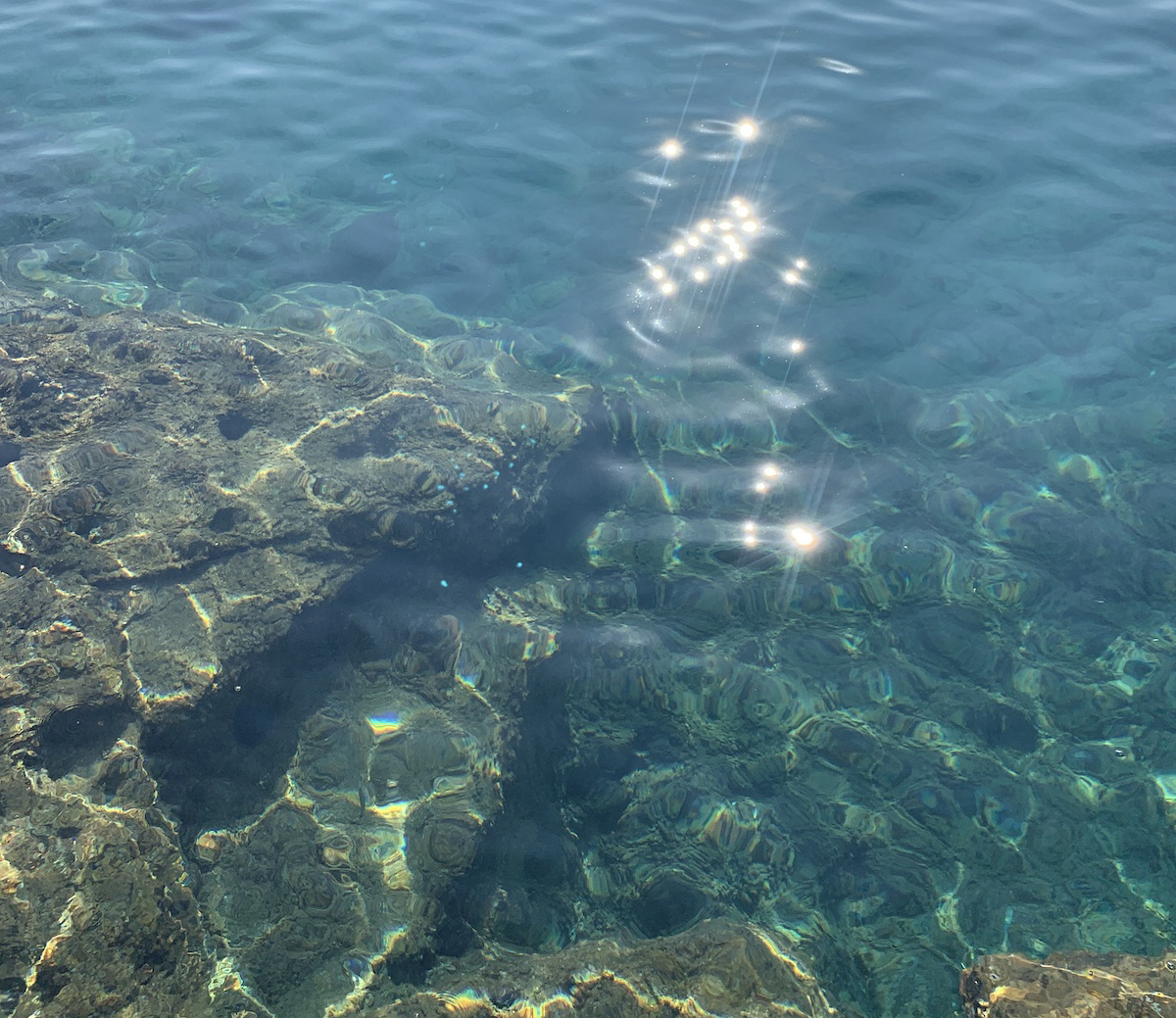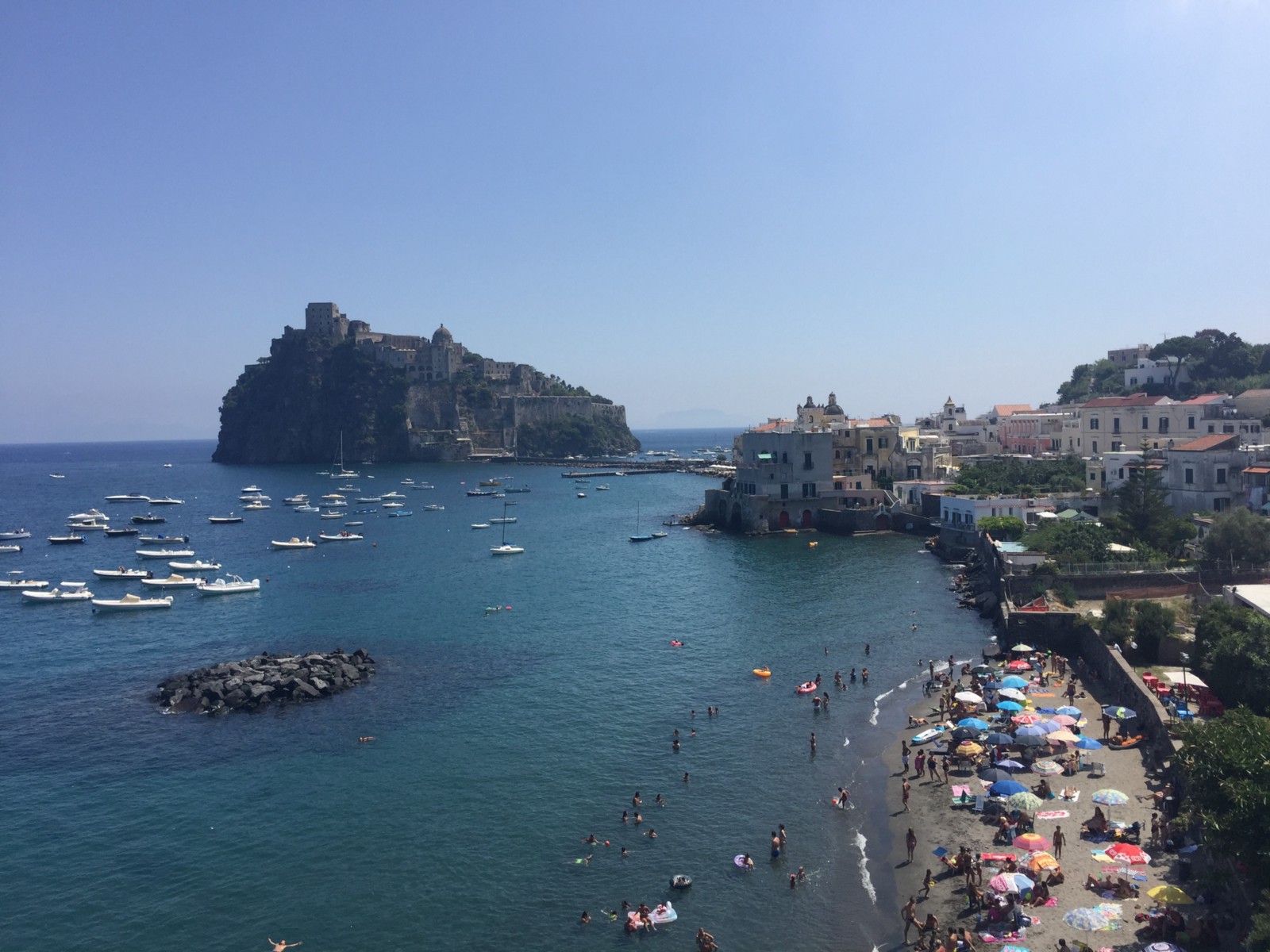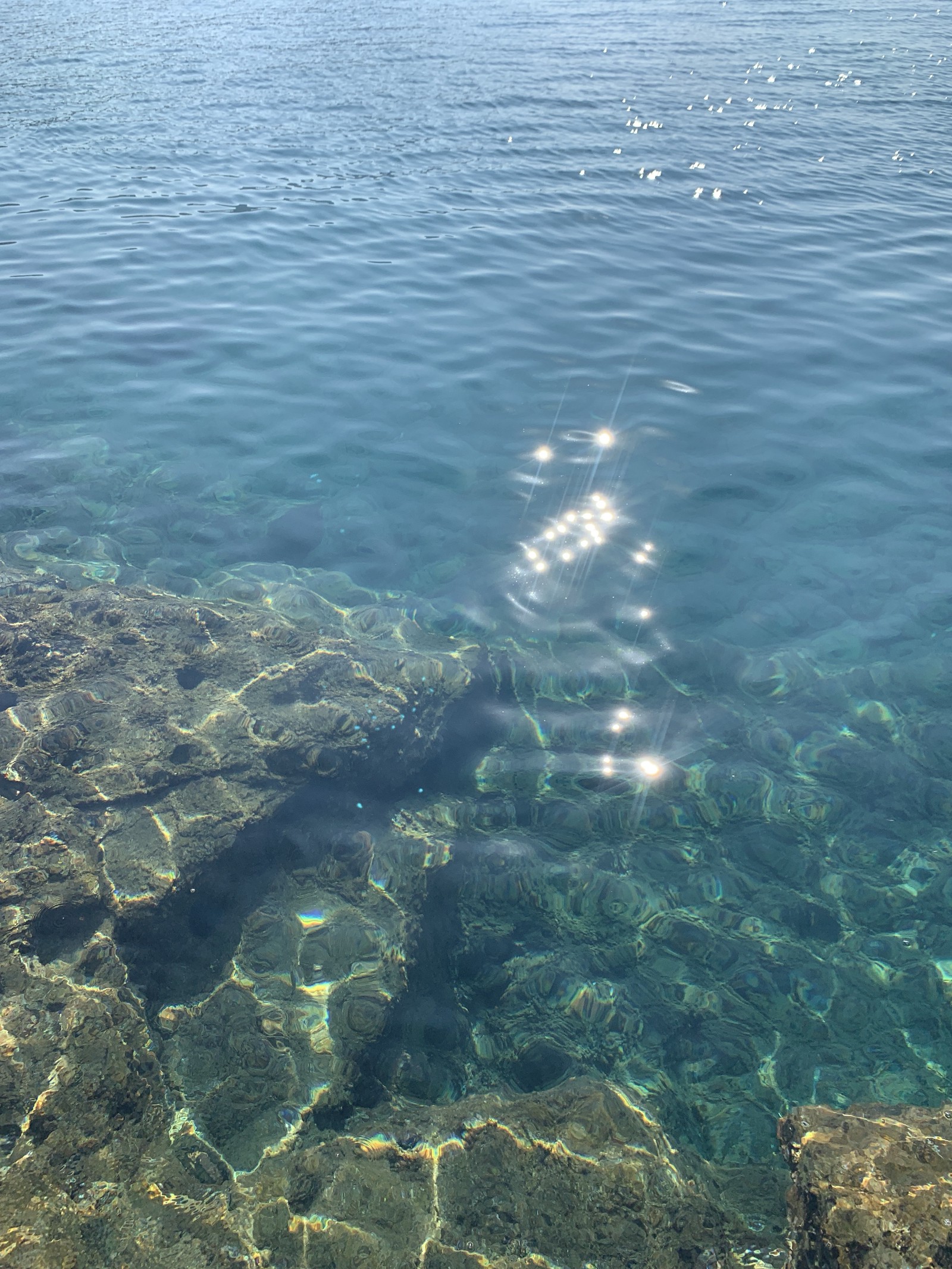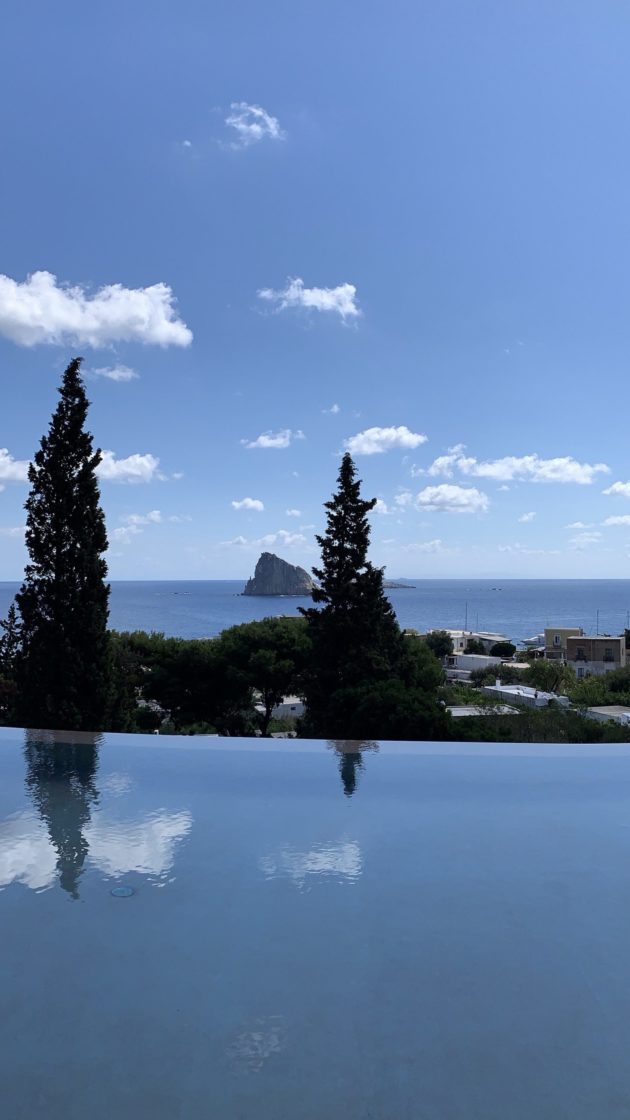The hydrofoil is gliding on the Tyrrhenian Sea, the water slick like oil.
The blue of the sea doesn’t quite merge with the sky on the horizon, but there is lightness and depth to the slight waves I observe from the upper deck. Once in a while, the boat propels upwards a little. It feels playful, somehow, as if mimicking a large mammal jumping in and out of waves that I can’t see from where I am sitting.
Since I was a child, I have always been fascinated by water.
The attraction manifested early on. My first important recollection of this is pretty dramatic, though. I was about three years old and my family was enjoying an early dinner at a friend’s house by Lake Geneva. Our hosts lived in a beautiful villa, perched high above the water, on top of a winding garden, which went down to their private pier on the water.
I recall from other visits that they also had a couple of frog ponds alongside the path that led down to their two boats. One was an orange and black inflatable dinghy, the other something more substantial, which I judged at the time was more for grown-ups. I accurately remember looking intently at the small one; it was so inviting. My little three-year-old self weighed the odds of whether or not I would make it to the boat, clearly the prospect of falling in the water not scaring me at all. Then, leaping and, well… Missing!
Thankfully, a friend of my father’s, an anesthesiologist from the clinic he worked at, noticed my absence, legged it down the garden and fished me out of the lake. Notice that I don’t know what this lady was called, but naming her profession feels like some kind of recognition, my small way to say thank you for saving my life.
This incident didn’t stop me from loving being in water or swimming. My younger brother, two years my junior, would often try to stay in the swimming pool as long as I did. The poor thing was a bit on the skinny side and his lips would turn blue from the cold, having stayed around me too long.
Meanwhile I would splash around for hours, playing the “Naiad” as my father often called me. My mother, on the other hand, wasn’t best pleased, she preferred me staying in the sun next to her, reading a book and getting a tan. I came to embrace this later on in my life. Let it be said that during those years, no amount of time outside would seem to colour my very pale skin. It took years of dedication, throwing myself in front of the blazing sun (always with sunscreen) for my body to finally accept to start colouring.
At some point, I even joked that I must have been adopted: everyone else in the family would turn a nice shade of brown at the earliest sign of summer sun. The darkest shade I got was what my mum called apricot colour. It’s a sweet analogy looking back, especially when you consider the soft quality of youthful skin.
During our summers, before going away in August, we spent most days at this little pool, only a couple of kilometres from the house. The lake was a little further away, and there was often talk of “puces de canards” if the water was too warm (duck fleas?) plus it just wasn’t quite as civilized as our sunspot in the countryside.
My favourite thing to do at the pool was probably to swim as long and as far as I could underwater. I would hold my breath and go for the entire length of the pool, competing with my own lungs’ capacities. My eyes would be wide open, taking in what I thought was one of the most enchanting sights in the world: the sun’s playful rays, penetrating deep in the water, moving around against the blue ceramic tiles. Witnessing this delicate light show brings me simple and immediate joy to this day.
Something happened, though. I am not sure exactly at what age, but I think at around 12 years old, I stopped opening my eyes underwater. There was just nothing you could do, bar using pliers, to separate my eyelids once under the surface. A feeling of danger, or possible pain, permeated my brain: my experience in the sea or pool was still lovely, but this thing I used to be able to do was no longer accessible to me. I never really thought about it any further, though.
Fast forward to a couple of years ago, when I was on holidays in Ischia, a beautifully green island off the coast of Naples, Italy. My friend Annie and I were at Eden, a lovely beach and restaurant, from which you can see the Castello Aragonese, in Ischia Porto.
There I found very much my kind of water, a deep and clear blue green, easy to see down to the sea bed, three or four meters below us. I took a plunge, delightfully, and suddenly my eyes flew open. There I was, swimming, eyes wide open in the sea. No more fear, nothing holding me back from enjoying the underwater landscape lit by the midday sun.
What had happened? I couldn’t tell you. This story only hit me in a bigger way earlier this year, when I was listening to a fellow student in our Yoga Teacher Training. She started telling her own story of metaphorical childhood vision and the return of her sight a couple of years ago. There is something there I thought, as I shared my own story with the group.
Dreams of water are incredibly common for me; whether a clear turquoise sea, a tsunami (more on that another time) or deep dark canals like Venice at night. Having started to write a morning journal a few year’s back, upon the recommendation of Tim Ferriss, a real source of insights for those like me who seek to better understand oneself, I noticed the pattern. So after a few reoccurrences, I googled it. What is the meaning of water in dreams? The answers mostly pointed to our subconscious, and a coach recently added that water also represents our emotions.
The eyes opening vs eyes closing then felt like a metaphor too big to ignore. Somehow decades on, I was no longer afraid to see deep down, to the true depth of my subconscious and emotions. Meditating daily, before or after the journaling, might have had something to do with my newfound freedom. The freedom to be comfortable in this realm represents my deepest feelings. So now, I invite you to take a plunge with me, to see into this a little more deeply.
My mum got very sick around the time I was 11 and 12 years old. She remained unwell for years. Her illness? Depression, coupled with alcoholism, with a side of suicidal tendencies.
We lived in a beautiful renovated farm, in a remote little village on the border between Switzerland and France. My father was a handsome, jovial gynaecologist and obstetrician, devoted to his children and beloved wife. My mother was a stay at home mum, model-like, tall, blond and very elegant, restrained. I remember her being very tender with us, my brother and I, when we were little. But I also remember that she often couldn’t stand the sight of my father and her passive-aggressive way of expressing it even in front of us, from very early on.
Her depression manifested itself when one day, I found her unable to get herself up from the living room floor, collapsed on the cold tiles. She cried, said something about being a bad mother and could I help her up and put her in bed because she was very tired and would feel better soon. This was sadly the first of many such events.
One morning, I opened a door and saw her naked in front of me, on the bathroom floor, inanimate. Somehow, my brother and I never stumbled upon her in this state when together. For many years I thought I had protected him from this, because I was older and my school hours ran until 3h30pm, I would always be home first. How foolish of me to assume he’d never witnessed it.
Meanwhile, I didn’t know she was drinking, what drinking meant, that she was taking pills too and that the combo was responsible for this mess. I am not even sure how long it took me to figure it out. I don’t remember any conversations with my father or brother, yet I am sure some conversations did take place. He must have addressed it, in some way, saying that mum was sick but she would be better soon. Anyways, the sadness, her tears and her shame when I helped her to her bed, led me to want to protect her. I think maybe that’s why we didn’t talk.
Years of this culminated in her trying to kill herself from drinking. Trust me when I say that this was a very sad sight and a very slow process, even for a woman who was also anorexic. She refused treatment, refused to be admitted to hospital, and you cannot commit someone against their will in Geneva, as I found out then. She would sit around the house, smoking, sometimes not noticing she was about to burn her fingers, her favorite cardigan showing signs of burns and holes, haggard. Sometimes she talked of conspiracy theories, strings of words that made no sense to me, probably no sense to her either.
My father and brother left for a while that summer, I think I was 16 or maybe 17, with my maternal grandfather. It was just for a week they said. They would be traveling through Belgium and maybe Holland, I am not so clear on the details. What was clear, though, is that in so doing they left me alone in the house, with her. Important to point out that I had no driver’s license, I also lived in a minute village of 350 inhabitants with not even a shop to go for groceries. The closest option was to go to the next village, which I could reach hourly reach by bus, or ride my bike.
In the middle of the week, thankfully, I don’t know how, my maternal grandmother showed up with one of my aunts. Not someone I was generally grateful to see. She was not a kind woman and my mother and her were mostly estranged, there was a dark relationship between them, probably responsible for a lot in her life.
But at that point, or that particular day, my poor mum could not even utter words anymore. She was rather limp in her bed. Her skin had started turning a strange colour. An ambulance was called. She couldn’t refuse to go. She couldn’t do anything at all. And she was driven to the hospital. I don’t remember what I did or what I said, all I could do was try to gather myself. I stayed behind, in the house, alone.
After she was admitted, the doctors gave us the prognosis and told us she had about a day or so to live. She had a very advanced cyrosis of the liver and jaundice had completely taken over her body. She was about 34kgs. Her belly protruded badly. Not very human looking.
I got on the bus A, the line from my village of Gy to Geneva. Alone but for the driver of the bus, we stopped at a pedestrian crossing and suddenly I started praying. I prayed that she would live. Despite the harshness of the life she had put us through, I deeply wanted to have my mother in my life. It was a short, powerful and unexpected burst. Out of character too, I am not religious, I have never even been baptized. I don’t remember praying before in my life. And I don’t remember praying again for many, many years.
A couple of days later, I walked into the house to find my brother bewildered, announcing that mum had just called him. I almost fell to the floor. How could it be, the day before, in her hospital bed, she couldn’t even bring a spoon to her own mouth. Out of nowhere, she went through what seems to be a miraculous recovery. Somehow, my prayer had been heard…
Of course, she never did recover fully. Her liver, this obstinate organ that keeps on regenerating, had responded well to the treatments. And perhaps having been down this darkest of holes, reached rock bottom, her heart had decided it wanted to go up, towards the light. Maybe she wanted to live. Or rather she didn’t want to die anymore.
At some point, before my father and brother had returned, I went through my mother’s things. Her bedroom was closed off to my father for years. I emptied it from so many empty bottles and cartons of wine and gin, hidden inside her boots, under the bed, behind her clothes. And I found letters, which I read, and that’s when I discovered that she had been unfaithful to my father, sleeping with some of our friends’ dad in the village. And earlier, she had already told me in drunken stupor that she’d had an affair with my favourite school teacher. Horror… I always thought he had a soft spot for me, a slightly abrasive but highly intelligent man with a dry sense of humour. And a drinking problem. As it turns out, he had been one of the catalysts to her demise, enticing her to drink when she had recently been put under antidepressants — which he might not have been aware of, I now realise.
Over the following years, she remained bitter towards my father, incredibly unkind and aggressive to my teenage eyes. I feel that he was a reminder of what she had done, a symbol of a life she found small. She had gone from her family (not an easy lot) to my father. Turns out she might have wanted something else, other than getting married and have kids…
Putting a proper lock on her door, she decided to remain under the same roof as us for another eight years. I let you imagine the atmosphere in the family home. There is something to be said about divorcing early rather than staying together. My father, meanwhile, was doing all he could to assume the role of father and mother. We jokingly said that he had turned into a jewish mother, from his dedication to learning how to cook his favourite pot roasts, feeding us, and taking care of us.
Note: he wasn’t jewish himself but his first wife was, and he had lived in Israel for years earlier. You can substitute this comparison to a Greek mum, Italian or Indian mum, I think you’ll get the gist. So he did the best he could and I will forever admire him for it, despite the many mistakes he made along the way. Who doesn’t make mistakes anyway.
My relationship with my mother was hard to navigate for many years. I was also too much like my dad, this did not sit well with her. I talked, ate, laughed, argued openly, I played piano and sang music, loudly, I expressed joy and the rest of my emotions freely. This disturbed her, so incapable she had been of expressing her own, whatever the reason. Many times when I talked animatedly about school or anything else, she would shush me. “Plus doucement s’il-te-plait…”
This gave me a sense I was just too much. She was more comfortable with quieter personalities, like my brother’s, their deep bond was very obvious, which left me feeling inadequate most of the time. This could be felt in the reverse for my brother between my father and I, leaving him feeling about the same I imagine. This being so much harder for both of us given the non-communication between the parents, rendering any sense of balance across all of us impossible to attain.
The expressions of tenderness I had known from her when I was a younger child pretty much disappeared. If anything, she often attacked me, referred to me as a fat cow because I wasn’t like her, sans muscles, skin and bones. What I remember most is walking around on eggshells for years.
Later on we patched things up, after I moved to London she called me. Shock! My mother called?I was taking a bath and when my German flatmate gave me the message, I could barely believe it. Maybe because I had had the guts to leave home and do things differently, things she had maybe dreamt to do and never did, she felt a new connection to me, a newfound respect.
She had started admiring me. She even asked me for cooking advice. Again, huge shock. My mother has always been the most amazing cook. An incredible source of pride for her husbands by the way. Her signature was flavoursome and delicate French food, while I devoured, Thai curries, Indian daal, and a lot of rustic Italian dishes. So we found ourselves on a new plane, both of us evolved around each other, not always smooth in our communication yet we fostered a kind and loving relationship with each other until she passed, five years ago.
My mother, for all her flaws had found love another time around. Like my father, he was a handsome, older, kind doctor that me and my brother came to love very much. My father and him even became friends. They never lived together, though they were besotted with each other. Living with a man was something she found insufferable and vowed not to do again, so they lived loving, intersecting lives. When he was diagnosed with prostate cancer, he moved into her little apartment. She nursed him tenderly (she was trained). He passed after a couple of years’ remission and she left us a few months later. She never wanted this life very much, my brother and I weren’t reason enough to stick around. Her love gone, the final straw, she had to go.
I made my peace with her and the tumultuous events of my childhood many years ago. I was a wise young adult who understood that my parents were just human beings. Doing the best they could. And that she was sick, really sick and had no friends, no career, no spirituality (she was a very big atheist), nothing to support her. My dad admitted to me much later, over dinner one night, that he had thought giving her children would be like giving her crutches. He had known of her disposition since they had met, but had the romantic – if completely unrealistic – notion that through loving her, he could change her. That he could “make her happy”. A big life lesson which I have carried with me ever since.
Unlike my mother, I feel profoundly connected to love, life, people and nature. This spirituality has been growing steadily, alongside or partially through my meditation and yoga practice s— which you can read about in some of my other posts. I can’t help but feel that opening my eyes under water again was a sign that I could now not just accept, but rather feel at home with everything that I went through, everything that was, and everything that is, today.
This past week, I visited the Aeolian islands with a good friend, moving around several beautiful locations on Salina and Panarea. All three hotels had lovely swimming pools.
There I enjoyed my deep dives, marveling at the same beauty I found as a child. Enjoying the moment so fully, the silky feeling of the water as I surged forward in each of my under water strokes, skimming the bottom of the pool while admiring the sun rays’ magical patterns. Feeling at home in the water like I feel at home with my emotions, with myself.
This article was originally published on Medium.com
All photographs: Anne Muhlethaler





